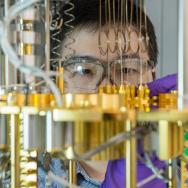In a fireside chat during last week’s 2020 Chicago Quantum Summit, Illinois Gov. J.B. Pritzker said famed Chicago architect Daniel Burnham’s adage to “make no little plans” is a fitting vision for the state of Illinois and the city of Chicago to live up to when it comes to building the quantum internet. Based on the Chicago area’s combination of elite research universities, national laboratories and a robust corporate sector, Illinois is well positioned “to become an industry leader” in the emerging field of quantum science, according to Pritzker, calling it “one of the most exciting opportunities for our economy for decades to come.”
Pritzker offered his insights on the impact of quantum science and its potential for economic growth for the state, the city, and the South Side specifically in conversation with UChicago’s Vice President for National Laboratories, Science Strategy, Innovation, and Global Initiatives Juan de Pablo as part of the summit’s second day of events on Nov. 12. The emerging quantum field is focused on developing new ways of understanding and exploiting the laws of quantum mechanics, the theory that governs nature at its smallest scales.
Hosted by the Chicago Quantum Exchange, this year’s summit was held just months after the U.S. Department of Energy announced it will fund five new National Quantum Information Science Research Centers, including centers led by UChicago-affiliated Argonne National Laboratory and Fermi National Accelerator Laboratory, which are each projected to receive $115 million in funding over the next five years.
Quantum’s potential impact on the local economy cannot be overstated, Pritzker said, noting that carving out a leading position in the emerging industry will attract top talent to study, work, and live in the Chicago area and signal to larger companies and government entities that the region offers smart investment opportunities.
The University of Chicago is working closely with the State and City to ensure that new economic and educational opportunities will be made available to its neighboring communities and residents on the South Side. This includes opportunities that will stem from a $200 million State of Illinois investment in building state-of-the-art quantum research infrastructure in Hyde Park in Chicago and Urbana-Champaign.
“By building an advanced quantum research facility near the University of Chicago, we're sending a clear message that the South Side of Chicago can be a home to a growing, world-beating industry,” Pritzker said, “and that we can grow a workforce that can live and shop and contribute to a local economy and have a pathway to the economic growth opportunities that have been sometimes sorely missing in places like the South Side of Chicago.”
UChicago’s existing free STEM programs for Chicago Public School students, for example, can introduce young people to the idea of quantum information who might not typically be exposed to these fields, Pritzker said. The University’s partnership with City Colleges of Chicago, designed to open pathways for community college students to transfer into four-year STEM degree programs, is another avenue to engage future quantum researchers and professionals locally.
Both programs and others like them, Pritzker said, access an often-untapped future workforce and connect young Chicagoans with a promising potential career path in their own community. “That's critical work to helping build STEM education, STEM knowledge, and experiences that may not be present in every school,” Pritzker said. “Again, early investments to make sure we're the winners here in quantum, and continue to be.”
While the effects of the state’s investment in the quantum field may not be fully felt for a decade or more, Pritzker emphasized how critical partners like the University of Chicago have already been and will continue to be in bringing the state’s larger quantum vision to life in the years to come.
“The people engaged in the quantum field and making Illinois already a leader in this are just the tremendously talented individuals that we're going to rely upon for the future,” Pritzker said, “and I think about a decade from now, I'll be thrilled when I'll be able to look back and say I played a small part in something that no doubt will transform our state and our nation.”
About the Chicago Quantum Exchange
The Chicago Quantum Exchange is headquartered at the University of Chicago’s Pritzker School of Molecular Engineering and is a leading national hub for the science and engineering of quantum information and for training tomorrow’s quantum workforce. Member institutions of the exchange include UChicago and its affiliated labs, Argonne and Fermilab, and the University of Illinois at Urbana-Champaign, University of Wisconsin-Madison, and Northwestern University.
The third annual Chicago Quantum Summit virtually brought together university, government, and industry leaders in the growing field of quantum information science for three days of programming focused on how to advance quantum science, build collaborations, and grow a quantum economy.










